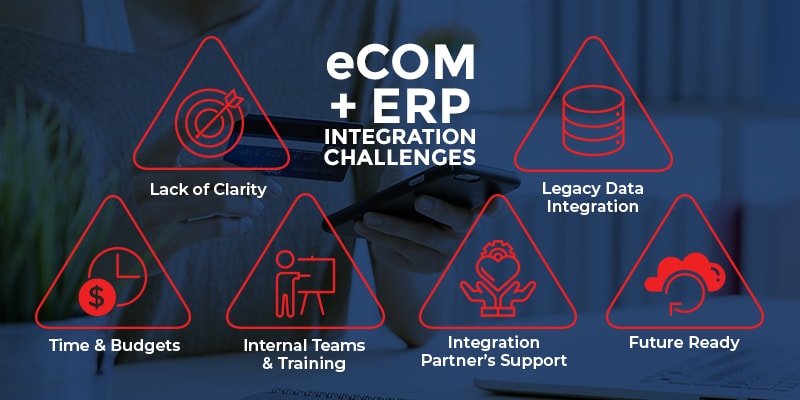How ERP Integration Benefits eCommerce Businesses: 7 Factors To Know

Integrating an ERP system with your eCommerce platform is a strategic decision that can transform your business operations. By combining ERP’s robust backend functionality with eCommerce’s front-end capabilities, companies can streamline processes, ensure data accuracy, and improve the customer experience. However, successful ERP eCommerce integration requires careful planning and consideration of several key factors to avoid potential pitfalls.
In this blog, we’ll explore the top 7 factors you need to consider before embarking on ERP eCommerce integration, ensuring the integration is seamless, scalable, and future-proof.
Example :
Imagine a fast-growing startup retail or eCommerce company with sales skyrocketing to 1,000 orders per month. Each new order requires about 5-10 minutes of manual data entry, totaling 80-160 hours monthly. That’s nearly 2-4 full-time employees just to handle order data, excluding customer follow-up, which demands more resources. Now think about scaling this process further. Manually tracking orders and customer experience becomes unsustainable.
ERP integration is no longer optional— it’s mandatory for growth, success, and productivity. Automating the data flow from shopping carts to backend systems eliminates the need for manual data entry, ensuring real-time updates, seamless inventory management, and better customer experiences. By integrating ERP, you free up your team to focus on strategic growth rather than administrative tasks.
As your business grows, the complexity of managing orders, tracking customer journeys, and scaling fulfillment demands a solution that evolves with you. ERP eCommerce integration is that solution—boosting efficiency, eliminating errors, and future-proofing your operations. Ready to scale efficiently? Automate today with ERP integration.
7 Critical Factors for Seamless ERP eCommerce Integration
1. Seamless Data Synchronization
Why Real-Time Data Matters
One of the most critical elements of ERP eCommerce integration is ensuring seamless, real-time data synchronization between the two systems. Accurate and timely data flow between your ERP and eCommerce platform is vital for keeping inventory levels, product details, pricing, and customer information up to date.
When data is synchronized in real-time, inventory counts automatically update across all platforms when a purchase is made. This eliminates overselling or underselling and ensures consistent information across channels. Without seamless synchronization, you risk operational inefficiencies and a poor customer experience due to delayed or incorrect data.
How to Ensure Efficient Data Flow:
- Choose an ERP system that supports APIs for real-time synchronization.
- Ensure your integration partner understands how to map and automate key data points like inventory, orders, and customer information.
2. Scalability of the Integration
Will Your Integration Scale with Business Growth?
Your business will likely grow over time—whether that’s expanding product lines, increasing order volume, or entering new markets. The ERP eCommerce integration you implement must be able to scale with this growth. If the system is too rigid or limited, it could hamper expansion, leading to inefficiencies as your business scales.
The integration should handle growing amounts of traffic, transactions, and product data seamlessly. It’s essential to choose both an ERP system and an integration solution that are flexible and can scale in parallel with your business needs.
What to Consider:
- Does the ERP system have the capacity to scale with your business?
- Can it handle large volumes of orders and product data as your eCommerce site grows?
- Is the integration solution flexible enough to accommodate future system upgrades and changes?
3. Customization and Flexibility
Tailor the Integration to Fit Your Business Needs
Every business has unique workflows, reporting needs, and processes. While out-of-the-box ERP eCommerce integrations might work for some, most businesses will need a customized solution. Your ERP integration should allow for tailored workflows and custom reporting that aligns with your specific operational needs.
Customization also plays a crucial role in integrating other business processes such as accounting, supply chain management, and customer service into the ERP eCommerce ecosystem. The flexibility of your chosen integration will determine how smoothly these additional workflows can be integrated.
Key Customization Considerations:
- Does the ERP system support custom workflows and integrations?
- Can the integration accommodate specific business requirements like custom product configurations or order processing rules?
- Is there flexibility for future changes or additions to the system?
4. Integration with Existing Systems
Ensure Compatibility Across All Business Applications
Your ERP system should work harmoniously with your existing business applications. An integration that creates silos between your CRM, marketing automation tools, or supply chain systems can disrupt workflows and reduce efficiency. The goal of ERP eCommerce integration is to streamline operations across the entire organization, so it’s essential to ensure that all systems can communicate with each other.
Incompatibility between systems leads to data fragmentation, which can cause issues with order tracking, customer data management, and inventory visibility. Integrating all your systems ensures a unified platform, where data flows seamlessly from one department to another, improving overall business performance.
What to Look For:
- Can the ERP system integrate with your existing CRM, supply chain management, and other critical tools?
- Does the integration platform support seamless data flow across all business systems?
- Is it possible to eliminate data silos, ensuring all teams have access to the same, accurate data?
5. Security and Compliance
Ensure Compatibility Across All Business Applications
Data security is a top priority, especially when integrating ERP with eCommerce platforms where sensitive information such as customer data, payment details, and transaction histories are stored. Your integration must include strong security measures to protect against breaches, hacking, and unauthorized access.
Additionally, your ERP eCommerce integration must comply with relevant regulations and standards, such as GDPR for data privacy or PCI DSS for payment security. Failing to meet these standards could result in significant financial penalties, as well as damage to your business’s reputation.
Ensure Secure and Compliant Integration:
- Does the integration meet the required security protocols and compliance regulations?
- Are data encryption, multi-factor authentication, and other security measures in place?
- Is the ERP system compliant with industry standards like GDPR, HIPAA, or PCI DSS?
6. Cost and ROI of Integration
Evaluate the Financial Implications and Long-Term Value
While ERP eCommerce integration can streamline your business operations, it’s essential to consider the cost and return on investment (ROI). The cost of integration isn’t just the initial setup—it includes ongoing maintenance, upgrades, and potential downtime. Understanding the total cost of ownership (TCO) will help you plan your budget more effectively.
On the other hand, a well-executed integration can deliver substantial ROI through improved efficiency, better data accuracy, and enhanced customer satisfaction. With smoother operations and reduced manual processes, your team can focus on growth rather than daily operational tasks.
Questions to Assess Cost and ROI:
- What is the initial and ongoing cost of ERP eCommerce integration?
- How long will it take to realize a positive ROI from the integration?
- Are there long-term financial benefits, such as cost savings through automation and reduced errors?
7. Data Migration and Integrity
When integrating ERP and eCommerce platforms, ensuring the accuracy and completeness of migrated data (customer information, transaction history, inventory) is critical. Invest in proper data migration tools and validation processes to ensure there are no discrepancies between the old and new systems.
Conclusion: Setting Up for ERP eCommerce Integration Success
By considering these 7 critical factors—data synchronization, scalability, customization, system compatibility, security, and cost—you can ensure a successful ERP eCommerce integration that drives efficiency, improves customer experiences, and supports future business growth. Integration isn’t just about linking systems; it’s about creating a unified business ecosystem that operates smoothly and efficiently.
If you’re ready to take the next step toward optimizing your ERP eCommerce integration, contact our NetSuite ERP implementation experts today to schedule a consultation. Let us help you streamline your operations and unlock the full potential of your ERP system.

Director – ERP Advisory & NetSuite Solutions




